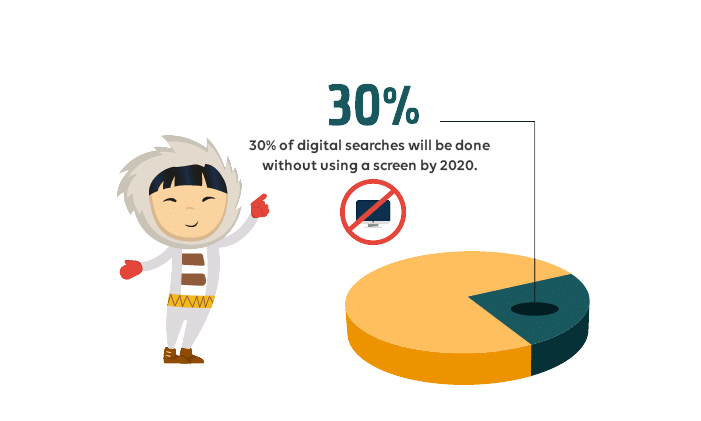Voice interfaces are changing many habits. Those of consumers, who are more and more likely to dictate their query to their smartphone or smart hub. But also, those of SEO and other marketing specialists who have little choice but to jump on the bandwagon and embrace this evolution whose consequences on SEO are already becoming palpable.
In June 2017, a British study revealed that 42% of Google users made voice queries each day (Google study). On that occasion, the web giant recommended that, based on the fast adoption curve of digital voice features, brands (and digital agencies) take Google voice search seriously. That was foresight!
In the meantime, voice search has been getting more and more popular. We can now definitely say it’s here to stay.
This observation poses quite a challenge for search engine optimisation, as Internet users don’t formulate their query in the same way when speaking as they do when writing. Without using a keyboard, they also change how they ask search engines questions. Pages optimized for traditional Search are not necessarily optimized for Voice Search. And thus, their rankings can’t be as good.

In practical terms, what is the impact of Google Voice Search on SEO? And how can we adapt to this change?
A Brief History of Modern Voice Search
Without going as far back as the very origins of voice recognition (and the research carried out by AT&T back in 1936), the birth of modern voice interfaces dates back to the creation of Siri Inc. in 2007. Offered for free in the App Store in 2010, the Siri application was bought out by Apple and integrated within the iPhone 4S for its launch in 2011. Microsoft then developed their Cortana (first for Windows 8.1 and Android devices), Samsung came out with their S Voice, Google with their Google Now (of which Google Assistant is an extension based on the use of artificial intelligence), and finally Amazon with their Alexa.

Nowadays, voice interfaces are available on smartphones, tablets and computers, but also through connected or smart speakers (Google Home and Amazon Echo). These various devices have rather successfully become as many entry points to homebound voice search.
Voice Search Figures
In May of 2016 Google’s CEO announced that 20% of the queries made in the USA from their engine’s Android application were made through voice command. Things have evolved significantly since then. Here are some figures showing how voice search is gaining in popularity around the world:
- Over 1 million voice queries were made in January 2018 alone.
- 46 % of daily voice searches have to do with local businesses or brands. In the space of one year, 50% of consumers have used a voice interface to find out information concerning a local business.
- 72 % of smart speaker owners have integrated their device into their daily life.
- 400 million devices come with Google Assistant.
- 39 % of Millennials will use a voice interface by 2019.
- 30% of digital searches will be done without the use of a screen by 2020.
(Figures source: BrightLocal.)
Voice Search in Practice
A 2014 Google study made another important point by showing how users use Google voice search:
- To make a precise, one-time query without wasting any time (finding an itinerary, looking for a location, looking up opening hours, playing a song, taking notes, calling someone from their contacts list, etc.).
- To make their life easier when they are already busy performing another task (cooking, practising a sport, watching TV, in the bathroom, on the go, etc.).
This gives us two takeaways: a large proportion of Google Voice Search queries are locally oriented, and Voice Search answers a number of situational issues (when we can’t use both hands).
From Mobile First to Voice First?
While Google is still in the midst of deploying its Mobile First Index, one can (already) legitimately ask the question: are we evolving towards a mainly voice-based search experience?

Three arguments can give us food for thought:
- The Mobile First Index aims to give a more prominent role to mobile searches in search results by considering mobile web pages as the main version of websites.
Yet, as we know, voice search (and more particularly Google Voice Search) is mainly done from mobile devices and screen-less devices (smart speakers). Both indexes are therefore connected.
- Google is very interested in the possibilities artificial intelligence has to offer. It’s certainly no accident that the company changed the name of its blog dedicated to R&D from Google Research to Google IA.
It just so happens that AI is one of the driving forces behind Google Voice Search thanks to one of its bricks: Natural Language Processing, or the way in which machines understand the subtleties of human speech to better answer … voice queries!
- Google integrates more and more data gathered by Google Voice Search, Google Assistant and Google Home speakers in its ranking algorithms.
The group even started (in early 2018) sending editors messages encouraging them to optimize their content (particularly news, podcasts and recipes: the top searches Internet users make using their voice) for Google Assistant.
But to go as far as to wonder whether Google might be preparing to slide towards a Voice First experience may still be premature. Nevertheless, many Search specialists stress that there are a number of reasons to believe that (as exemplified in this article), even if we’re not quite there yet.
We can still make one observation: Google is betting on the fact that the users of tomorrow will prefer dictating and listening to writing and reading. It will first be the case for highly specific content, such as recipes (it’s not easy to read while chopping vegetables!), news (which we listen to while having breakfast or driving) and podcasts (which we enjoy on the go: commute, sports practice, etc.). Eventually, more and more content could follow suit.
What is the Impact on SEO?
Consequently, it’s a good idea to prepare your website for the impending Google Voice Search revolution rather than to wait for the tide to turn – once all your competitors are doing it at the same time, blocking any chance you may have of monopolizing the top rankings in the SERPs.

So, what’s the impact of Google Voice Search on SEO, exactly?
There are several major trends:
- More and more queries are turning into questions. Voice Search, which is often local, lends itself to the interrogative form: ‘at what time does my movie start?’ or ‘what pizza place is still open at this time?” Besides, a large majority of local searches are followed by an action (phone call, trip, etc.)
- Queries are becoming proper sentences. When typing keywords in Google on their keyboard, Internet users tend to erase anything that doesn’t make sense to a search engine – articles, prepositions, determiners… The search engine doesn’t take them into account anyway.
But when voiced, they take the form of longer and more proper sentences: ‘Google, what’s the weather like this afternoon?’ or ‘who won the French Open men’s singles title this year?” etc.
- Queries are becoming longer. And as soon as queries become complete sentences, more words are naturally added. There is an evolution from generic keywords to long tail expressions. We don’t search for ‘bakery Paris Sunday’, but rather for ‘which bakeries are open on a Sunday in Paris?”
- Wording errors still exist, but they are different. The biggest problem SEO specialists currently face is spelling mistakes: they need to account for the fact that Internet users could write ‘real estate’, but also ‘realstate’ or ‘reel estate’.
The voice interface contributes to eliminating these mistakes since it ‘writes’ the query based on the Internet user’s speech.
However, this transfer can result in other types of errors: incomprehension and misunderstandings, such as mistaking one word for another.
- Position zero is even more strategic. Highly sought after by brands because it shows up at the very top of SERPs, the coveted position zero is also the one and only resource used by voice assistants to answer a user’s specific query.
This is normal: Google Home isn’t going to give you a whole list of results and ask you to select the most relevant! The interface itself therefore needs to make its own choice by drawing from the results this position offers. In that sense, the first answer is the right one – and the first position is the only one that matters.
What remains to be seen is how to take these trends into account to optimize your SEO for Google Voice Search.
How to optimize your website for Google Voice Search?
Several methods allow you to optimize your web pages to take advantage of Google Voice Search. Here’s an overview of the main levers.

CONTENT
The issues pertaining to Google Voice Search require the modification of your content by shifting its main purpose: It is now about:
- Answering specific questions in a clear, simple and detailed manner.
- Writing content that answers the users’ most frequent questions, containing high added value information.
- Wording the question in several ways to cover all formal possibilities (including misunderstandings derived from the interface not interpreting the query correctly).
- Offering longer, more semantically rich content.
- Publishing educational and didactic content which can easily be summed up in the form of featured snippets.
- Reworking the structure of existing content to include a question in the title, to offer a succinct answer as an introduction and to give more detail in the rest of the page.
The latter suggestion possesses the additional advantage of optimizing your introductory information for Google Voice Search with a small chance of reaching position zero, all while guaranteeing better rankings in general thanks to the denser content that follows.
To meet the requirements set by Google Voice Search in terms of SEO, FAQs (as these, by definition, offer questions and answers) and forums (as Internet users’ questions are worded quite naturally) are said to be making a huge comeback.
KEYWORDS
Through Google Voice Search, it is also the relationship we entertain with keywords that must change on two levels:
- By working in longer and more precise keywords (long tail) and by sprinkling in expressions that are semantically similar to the main query. Long tail is well adapted to this new type of interrogative and natural queries.
- By focusing less and less on keywords to prioritize high value-added content which can give a precise answer to a specific query and satisfy the users.
STRUCTURED DATA
Structured data plays a major role in user experience quality within Google Voice Search. Included in your pages’ markup code, this data is used to create rich results (rich cards, rich snippets) that are particularly well suited to local (and therefore voice) search.

Even if structured data is not a ranking factor, you can help Google’s robots understand your pages better and therefore position your content higher in Google Voice Search results.
MOBILE-FRIENDLINESS
By now it’s probably obvious, but it is absolutely essential to offer web pages that are optimized for mobile devices. Voice search is mostly used on smartphones and tablets, and mobile uses are its true raison d’être.
CONSUMER ORIENTEDNESS
Google Voice Search is also a means for businesses and brands to communicate with their customers in a more personal way, to reach them more effectively and to engage with them more successfully. Consequently, your SEO strategy should be consumer-oriented and it is very important to understand their needs, expectations and the issues they face to offer them the best answer possible through your Google Voice Search optimized content.

Voice Search is underway. If you don’t intend to be left behind, it’s time to jump on the bandwagon and to re-examine your SEO strategy!











